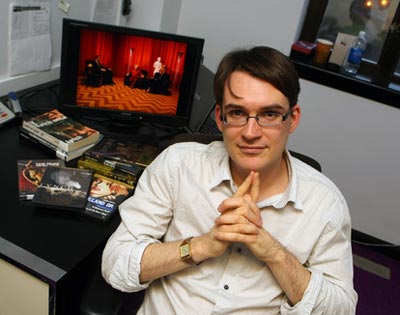 |
| Prof. David Nicol is teaching a new course on director David Lynch. (Nick Pearce Photo) |
Professor David Nicol plans to delve into that question with his new theatre/film studies course THEA 3351: The Cinema of David Lynch, which will be offered for the first time next semester. Prof. Nicol, who teaches theatre classes on both film and dramatic literature, claims a longstanding fascination with David Lynch.
“I was exposed to Dune. You know Dune? I apologize. I feel bad for you. I was brought to see Dune when I was 10 by my friend’s dad for my friend’s birthday… which is outrageous, because it’s a 15-certificate movie.” (Fifteen-certificate is roughly analogous to the North American PG-13; Prof. Nicol is British). “I remember very little from it,” he adds, “except that it may have made me the person I am today.”
His next exposure was Lynch’s The Elephant Man, a relatively straightforward John Merrick biopic. Then in 1990, Professor Nicol – and much of the rest of western civilization -- tuned in for Lynch’s televised mystery soap opera, Twin Peaks. “My parents kind of dropped out after the first three or four episodes. I kept watching it up in my room.”
Many people reacted to Lynch’s works in the manner of the elder Nicols—film critic Roger Ebert famously detested Blue Velvet. But with insulating quantities of time and space between humanity in general and shock masterpieces like Eraserhead and Lost Highway, some feel it’s finally safe to start evaluating Lynch’s work in a new light.
“People were starting to look back on it (Blue Velvet) and started to see it as a modern classic,” says Prof. Nicol. As for his own interest in the director, “I keep sort of coming back to David Lynch, because he’s very useful… in terms of teaching film.” The slow, deliberate pacing of the films makes them good raw material for basic analysis, as does their use of light and their repeated reuse of the same symbols and even the same actors.
But how do you even start teaching a course on someone known, essentially, for well-paced, carefully shot insanity? “Psychoanalytic theory is going to be pretty necessary,” he says. “A lot of people taking (the class) are going to be massive Lynch geeks, which is going to be helpful… essentially we’re going to learn a lot about David Lynch’s inspirations.”
 |
| Filmmaker David Lynch. |
These inspirations are incongruously tame – films like Sunset Boulevard, for instance, which Lynch apparently has his cast and crew screen before every shoot. The class will also examine Lynch’s most common motifs – things like red curtains, which may be found in Mulholland Drive, Twin Peaks, Lost Highway, and possibly Eraserhead (“They may be red. It’s hard to tell. It’s black and white.”) Prof. Nicol sees Lynch as an ‘auteur’, a single artist-director exploring a consistent set of themes over the course of his movies—whether those movies are enjoyable or not isn’t really the point. “You can’t genuinely claim that Dune is a good movie… (but) here I am, sitting here, 25 years later, and I’m still disturbed by (Dune’s) sand worms. And that’s why I’m saying that Dune is such a wonderful movie in some respects.”
Since this is Dalhousie’s first course on a single director, “this is a new direction for us,” says Prof. Nicol. And while courses on Lynch have been taught at other universities, he “deliberately didn’t look. It’s a very Lynch-y attitude. I didn’t want to be second-guessed. I feel like it’s like an interesting experiment. Anything could happen. It’ll be like making Eraserhead, in a way.”
Those interested in taking part in an experimental academic Eraserhead (a very frightening prospect in many respects) should act soon because space is limited. All self-respecting geeks (myself included) will want to know what really killed Laura Palmer.
Dal News writer Rebecca Schneidereit is a fourth-year English and Theatre student. She has also written for Fathom, The Gazette and Disney’s Propaganda Games.
